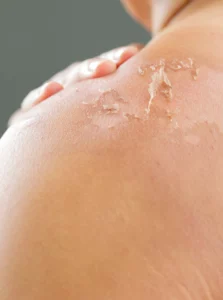
Skin cancers are the most common type of cancer and can affect people of all ages and races. In South Africa, high levels of ultraviolet radiation from the sun place residents at greater risk of developing skin cancer.
The skin is our largest organ, and with South Africans’ love of the outdoors, we have a high prevalence of skin cancers in our country,” says Dr Ayesha Omar, a dermatologist practising at Netcare Linksfield Hospital.
The most significant types of skin cancer are melanoma skin cancer, and basal cell and squamous cell cancer, which are categorised as non-melanoma cancers.
“Non-melanoma cancers can usually be treated successfully if detected early. Melanoma, however, is more serious because it tends to spread. It can develop within a mole you already have on your skin or appear suddenly as a dark spot on the skin that looks different from the rest,” she says.
It is important to look out for any of the following:
A for asymmetry: is one side of the mole bigger or a different shape from the other?
B for border: is the outline of the mole irregular?
C for colours: does the mole have multiple colours or shades?
D for diameter: is the mole larger than six millimetres in diameter or rapidly growing?
E for evolution: has the mole changed? Is it bleeding or itchy?
“Early detection is key. Any suspicious mole should be checked by a dermatologist for any potential abnormalities and, if needed, the mole should be surgically removed and sent for histopathology to determine whether further investigation and referral to a surgeon and/or oncologist may be needed.”
Individual risk factors
Dr Omar points out that the recommended frequency of screening depends on one’s individual risk factors, which a dermatologist will assess, but it is usually annually.
“People of all races can be at risk for skin cancer, particularly those who have a family risk of cancer or have had cancer previously, people who smoke, immunocompromised individuals and those taking immunosuppressant medications.
“Fair skinned people, especially blondes and redheads with light colour eyes, are at high risk because their skin has less melanin pigment, which offers some natural protection against skin cancer.
People who have lots of freckles and moles should also discuss their personal risk with a dermatologist,” she says.
Defend yourself from the sun
“There is no such thing as a ‘healthy tan’. Apart from the sun’s UV rays, tanning beds also pose a serious risk,” Dr Omar says.
“People working outdoors and those playing sports such as water polo, cricket, golf, bowls and others spending hours in the sun must take extra precautions to protect their skin.”
Sun facts
- South Africa’s average UV index is often extreme
- Avoid the sun between 10am and 3pm
- UV damage can still occur in the shade, underwater and on cloudy days
- Radiation from childhood sun exposure can cause skin cancer in later life.
Sunblock
- Apply sunscreen with a minimum sun protection factor (SPF) of 30 as part of your daily routine
- Apply at least 15 minutes before heading outdoors
- Reapply regularly every two hours, and more often if you swim, perspire, or towel it off
- Check expiry dates and that your product is endorsed by the Cancer Association of SA (CANSA).
Sun barriers
- Wear a wide-brimmed hat
- Use a parasol, umbrella, or wrap to shade yourself from the sun
- Choose items endorsed by CANSA
- Sun sleeves and clothing can help limit sun exposure
- Don’t forget UV protection in your choice of glasses or sunglasses.
“As South Africans, we must take the risks of skin cancer seriously and not become complacent at any time of year. Everyday precautions against UV radiation and dermatological screenings are an investment in your long-term health, with greater awareness, lives can be saved,” Dr Omar concludes




